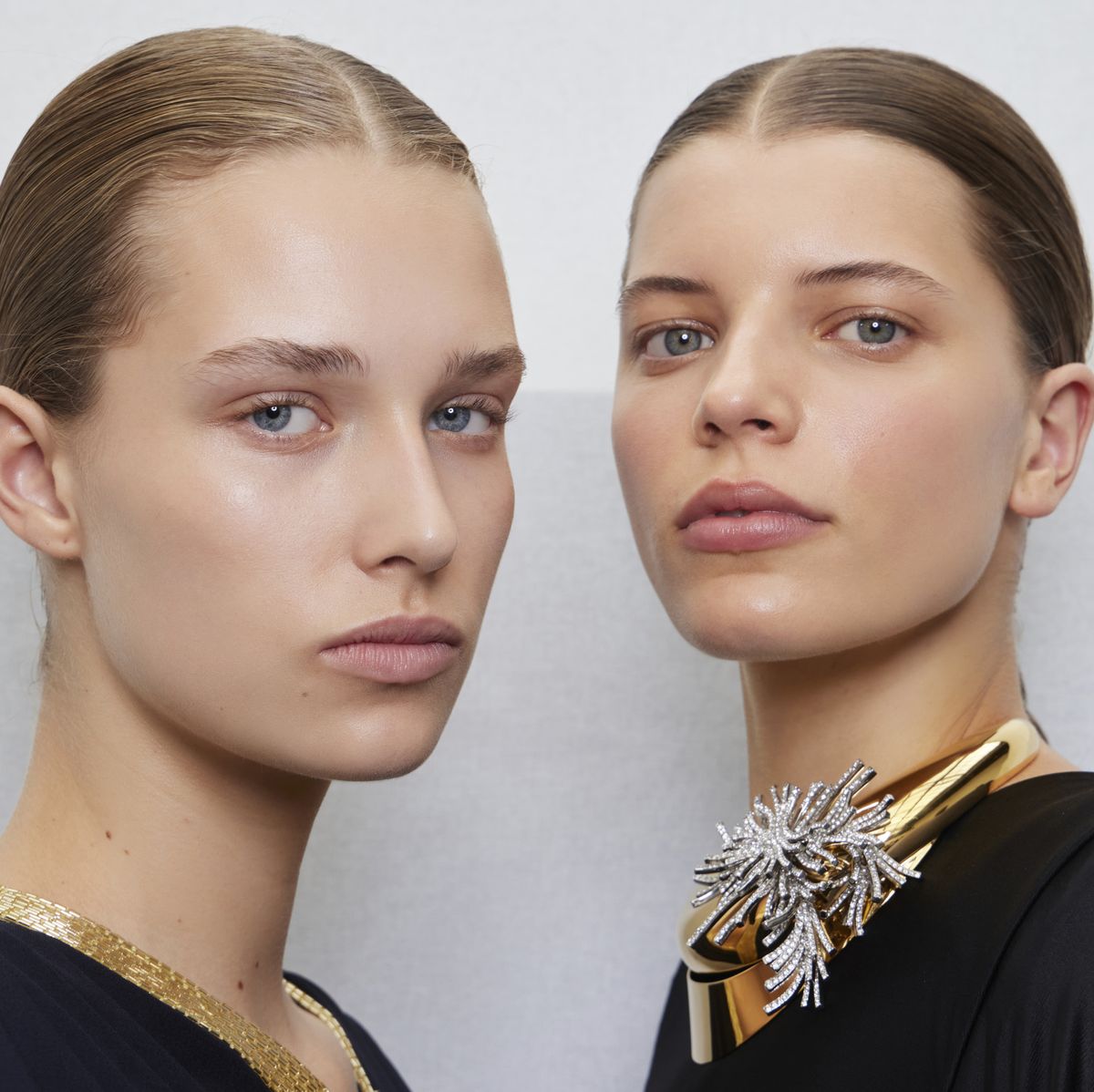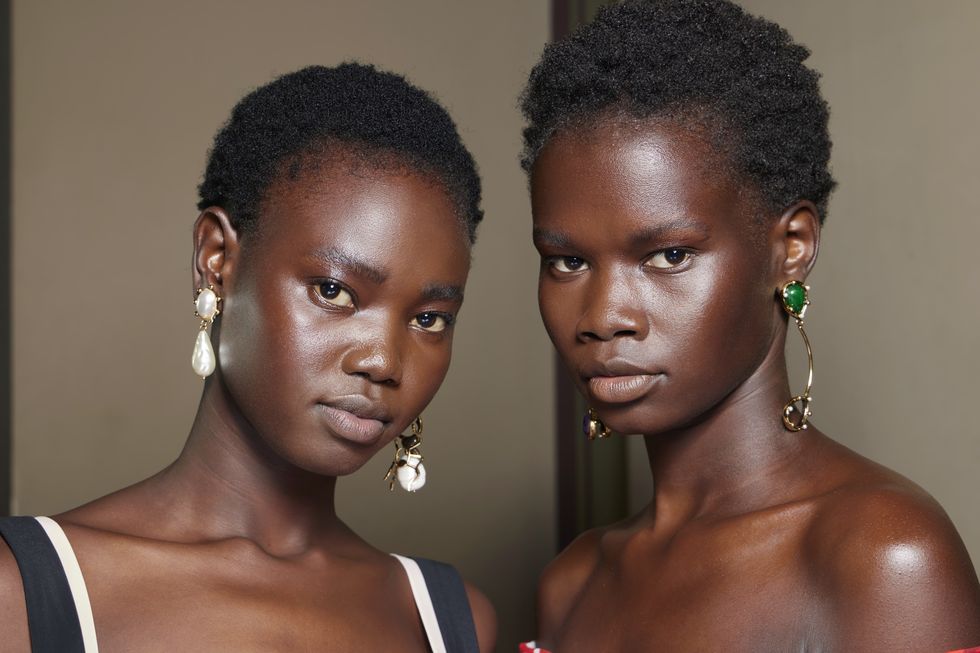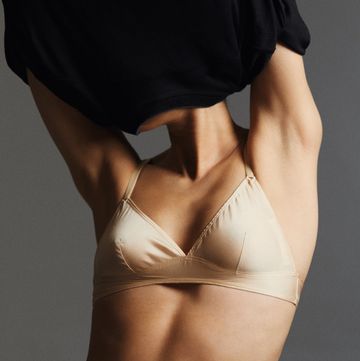The benchmark of a solid skincare routine used to be simple. Wash your face, apply SPF, cleanse, tone and moisturise. Skincare was skin deep – and that was the point. Today, the beauty landscape tells a different story, where increasingly the lines between beauty and wellness are blurring, teetering anywhere between a mindful, multi-step routine and embracing the next frontier of ‘skin spirituality’. Wherever you sit on the wellness spectrum, the routine you once relied upon for the sole purpose of better skin now has far greater meaning – and the claims of reducing cortisol, boosting cognition, and optimising your wellbeing make it all the more enticing.
‘We are definitely entering the era of emotional skincare,’ says Clare Varga, head of beauty at trend forecasting company WGSN, who notes a major shift taking place in the world of skincare right now. From sexual health to sleep, ingestibles, and the resurgence of traditional methods like traditional chinese medicine (TCM) and aromatherapy, the skincare industry is tapping into just about every wellness avenue. ‘Skincare has been slowly evolving with the growth of the wellness economy and adopting many of its markers to blur the boundaries between beauty and health,’ agrees Lisa Payne, head of beauty at another trend forecasting company, Stylus. And when you consider that the wellness market, estimated to be worth approximately £1.1 trillion globally, is set to grow by up to 10% by 2027, according to consulting group Mckinsey & Company, you could draw an easy explanation as to why.
But it’s not just a lucrative opportunity for beauty brands. ‘This shift is a reflection of evolving consumer values and a more holistic approach to beauty,’ adds Varga. Perhaps a sofa-bound pandemic and lockdown trilogy is to blame, when understanding how to better our wellbeing wasn’t a luxury, but a necessity. Needless to say, wellness has been driving the skincare conversation ever since.
A quick scan of the latest launches filling up the shelves reads like a 'Goopified' lexicon where you’d be hard pressed to find a serum that doesn’t tap into your neural pathways; a night cream that doesn’t also lull you into slumber and a new acu-targeted skin range to pinpoint your acupressure points mid-cleanse. Even my own routine has had a wellness makeover. Though it might be more stripped back than it was in previous years (a 10-step routine is so 2010, after all), my integrated approach to wellness sees a more complex regime than ever. I use my LED mask to tackle both skincare concerns and Seasonal Affective Disorder (SAD). I tap into acupressure points on the daily for lymphatic drainage and reducing cortisol. I've tried sound healing facials (and enjoyed them). I add collagen to my smoothies and I’m a sucker for the sensorial promise of skincare. See: uplifting scents that add a ritualistic element to my already intricate routine.
But at what stage do you begin to do your dermis a disservice? During a time when hard-earned pennies are precious and a scented serum is unlikely to dull the unnerving news cycles, is all of this a soul-soothing promise or are we adding further stress to our increasingly convoluted skincare routines? ‘Wellness burnout is the new modern ilk,’ notes Payne. ‘With so many philosophies, practices and concepts that make up the commercial wellness universe, it is all too easy for consumers with already busy, full lives to feel the pressure to embrace them all.’ With yet another thing to add to a growing to-do list comes the inevitable feeling of failure and the growing pressure to do it all. I’ve been victim to this feeling myself; the simple promise of a face mask and five minutes away from my screen turning into an obligation, a ‘should’, as opposed to what it is: a moment of self-care.
It also begs the question: can this new frontier actually improve our skin? Those in favour will tell you it all boils down to the skin-mind connection - a focus on a 360-degree approach to skin health - or the more scientific term ‘psychodermatology’. Put simply, it takes everything, from your sleep to your stress levels and even your emotions, into consideration. ‘The skin-mind connection is the relationship and interaction between the brain and our skin. It's the impact of the way we are feeling and how this effects the skin, as well as the reverse; how skin conditions like eczema, dermatitis and acne affects the way we feel,’ explains Dr Justine Hextall, a dermatologist for La Roche-Posay. ‘As the biggest organ in your body, your skin is like a mirror reflecting your inner health; it constantly gives us a lot of clues about what's going on,’ adds Ada Ooi, a TCM expert and celebrity facialist. And where the science is concerned, there’s a lot of compelling evidence to back it up. A study by Aveeno, for instance, found that those with rosacea or acne are more likely to suffer from lower self-esteem and depression and the same portion of dermatology patients have emotional disorders, per insight by WGSN.
But while there’s no denying the power of the skin-mind connection, the sheer number of beauty brands suddenly jumping on the wellness bandwagon is staggering. In the last year alone, my inbox has been filled with new launches sitting at the intersection of wellness and skincare; there’s a sudden interest in stress-busting formulations and bold promises of boosting cognitive function, improving sleep and lifting the mood. Japanese-born brand Tatcha launched a new skincare collection inspired by forest bathing which calls upon the cortisol-reducing power of immersing yourself in nature. It smells delightful and I’m a fan of the formulas myself, but can it really mimic the benefits of getting outside? Meanwhile, Pause, which has launched at xydrobe London by Dr. Barbara Sturm, is an immersive experience into an anti-inflammatory 4-D world that aims to promote a sense of calm. Relaxing, yes - but just how far can a VR meditation improve skin's inflammation?
Now more than ever, we’re connecting the dots between our overall wellbeing and skin health, but these skincare solutions aren't a magic bullet. As Dr. Hextall puts it: ‘The benefits of a walk in nature, a good night’s sleep and a healthy gut probably cannot be realistically bottled in a night serum with the same benefit.’ That said, she is in favour of looking holistically at the skin – meaning it's not time to retire your sensorial bodycare just yet. ‘I am pleased that we are finally discussing a more rounded approach to prioritising sleep, reducing stress, looking after our gut health as I am sure that once these are optimised, most people will see a benefit in their skin,’ she says. ‘I see these changes at the core of sustainable skin health.'
Indeed, while naysayers might suggest that skincare brands are simply profiting from a stressed-out, sleep-deprived nation, for the experts who have been integrating this approach since the very beginning, this new shift is actually a step in the right direction. ‘As a practitioner and brand founder who is deeply rooted in Traditional Chinese Medicine and has a holistic, integrated approach to skincare, I see the growing integration of wellness into skincare as a positive movement,’ says Ooi. ‘The shift acknowledges that skincare isn't just about external treatments but also involves internal nourishment and balance.'
Annee de Mamiel agrees. ‘The more wellness becomes part of our everyday routine, the better we feel.’ However, that doesn't mean trying every new product under the sun. Where beauty brands are concerned, adding unsubstantiated claims or further stress isn’t the solution here, but calling upon new research and tapping into a more integrated approach is. ‘We can treat the symptom by adding moisture or hydration, but we can also integrate neuroscience ingredients which have been shown to help calm the skin directly and also working at an emotional level to calm the stress response – through massage and touch, deep breathing and essential oils we shift the brain chemistry to help shift our mood,’ adds Mamiel, who carried out a a study on the brainwaves with First Fix - Cortisol Resilience Complex. 'It's given us proof that this scent significantly increases calmness and reduces reactivity,' she says. De Mamiel isn't the only brand using data to back up its claims. You’re Looking Well is linking gut health and skin health with a routine centred on science-backed skincare and supplements that work in harmony, while Aromatherapy Associates created a 'Skin Stress Relief technology' to restore balance to both mind and skin based on its years-old knowledge of the power of aromatherapy and new beauty brand AWvi is harnessing science within its next-gen holistic skincare line.
Looking ahead, wellness is going to be front and centre of skincare. ‘The intersection between wellness and skincare will see a focus on intuitive skincare that works with the body's natural cycles or life stage and also "aura beauty" which will see science-led skincare fused with "alt science" and belief systems… think crystals and TCM,’ says Varga, who believes we haven't even scratched the surface yet.
So is this new frontier a help or hindrance? As a beauty editor who is the first to succumb to a buzzy wellness trend, I’ve had to take a long hard look at what’s serving my own routine. Is the latest crystal-infused skincare or ‘skin rewilding’ trend really going to yield the same results as my science-backed retinol? Probably not. But do I reap the rewards of a sensorial and holistic routine? Yes. What I’m now trying to focus on is consistency and sticking to the skincare brands that have been championing the skin-mind connection since their inception. Viral TikTok terms, bold claims with little research and bottling wellness trends might not yield the results I’m looking for. Instead, I’m prioritising creating a more sustainable relationship with my mind, body and skin, looking at how my diet, stress and sleep all impact my skin health.
Indeed, if there’s one takeaway here it’s that treating our body as a whole is the real solution. As for that reiki facial, the jury's still out...















